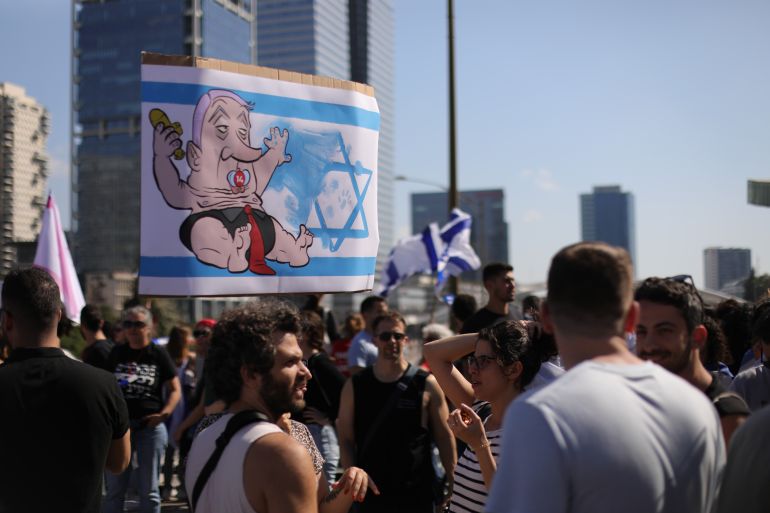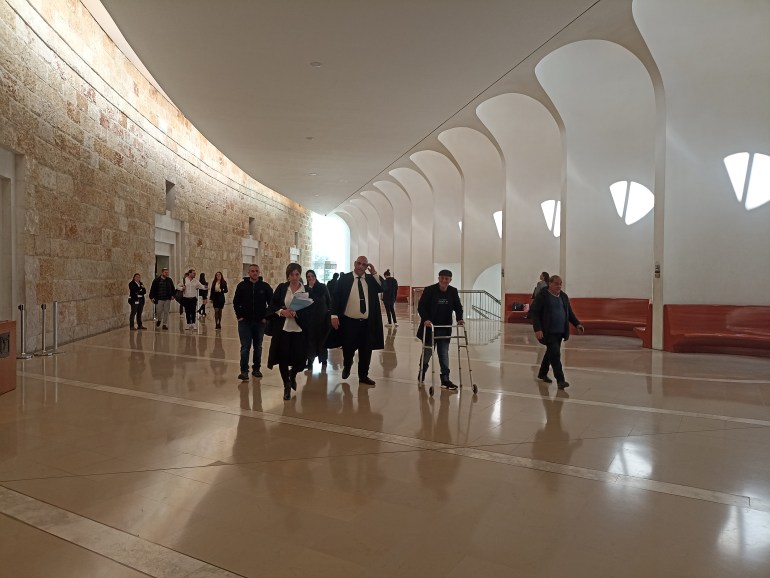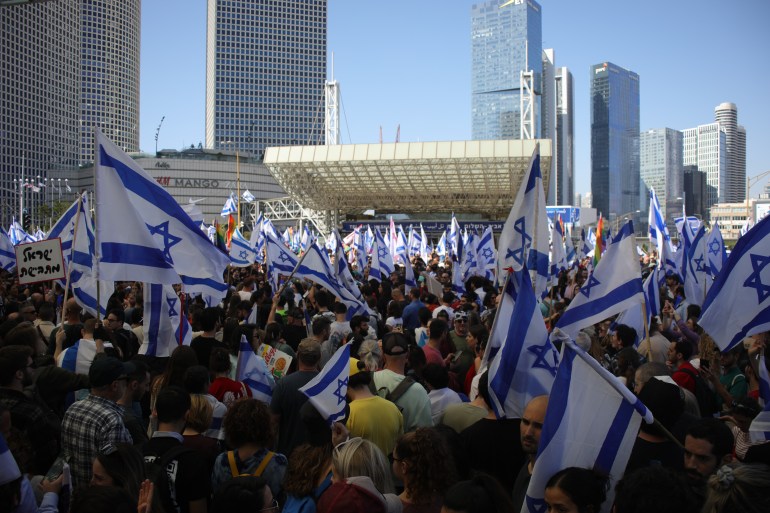Israel protesters vow to continue until judicial ‘reform’ gone
PM Benjamin Netanyahu’s statement Monday hasn’t appeased those opposing his perceived desire to control the judiciary.

West Jerusalem – As Israelis wake up after a tumultuous night of protests and an evening speech by the prime minister, many of them are adamant that the protests will continue until they achieve their demands.
Prime Minister Benjamin Netanyahu announced on Monday night a pause on his controversial judicial reforms to “allow dialogue” and avoid a “civil war” – succumbing to growing pressure from within his own coalition a day after one of the biggest protests in Israel’s history.
Keep reading
list of 4 itemsDozens of pro-Palestinian protesters arrested as Columbia clears encampment
Top USC graduate cancelled over Gaza speaks out
Photos: Thousands protest in Georgia over contentious ‘foreign agents’ bill
The proposed changes would see the Supreme Court’s ability to rule laws unconstitutional taken away from it and would give the government a greater say in the selection of judges, proposals that angered many in Israel.
People had been protesting against the proposed “reforms” for months, but after news of Netanyahu firing Defence Minister Yoav Gallant one day after the latter called for a halt to the process, tens of thousands gathered in the streets in a show of spontaneous anger.
Painting the protesters as extremists, Netanyahu portrayed his capitulation to the opposition in terms of the biblical character King Solomon, famous for his wisdom and tolerance.

“I am not ready to tear the country apart” announced Netanyahu, referring to the growing rift between leading members of the military and his own government. “It is forbidden that there will be a civil war”.
Steps away from the Prime Minister’s Office where Netanyahu spoke, business had gone on as usual earlier at the fortified Supreme Court of Israel, while Israeli civil society froze for the day.
With the large Histadrut labour federation announcing a “historic strike”, departing flights at Ben Gurion Airport were halted, alongside universities, malls and many other institutions across the country for the day.
Early on Tuesday morning, Israeli President Isaac Herzog called on the government and the opposition to begin “an immediate negotiation process” to find a compromise over the proposed judicial “reform”.
Growing dissent in the ranks
Netanyahu’s plan was temporarily foiled due to growing dissent amongst members of his own party and increased resistance from Israeli’s military reserves refusing to serve.
While dissent has been quietly growing within Netanayahu’s ranks for weeks, Defence Minister Yoav Gallant was the first to formally break rank Saturday night, earning himself an early termination Sunday night. Gallant’s firing proved to be the last straw, while Netanyahu swore on the correctness of his path and his intent to continue to push for judicial “reform”.
Israeli society, which views its mandatory civilian army as essential to protecting the country from imminent disaster, proved to be extremely sensitive to the firing of a defence minister – especially under the current conditions and with the perception of Netanyahu’s self-serving political motive.
“Netanyahu has traditionally been viewed as a backer of the Supreme Court, who spoke about the importance of an independent judiciary as recently as three years ago,” explains Eli Kowaz, policy adviser at the Israel Policy Forum. Many are viewing his motivation as fundamentally “to escape his legal conundrum and three indictments.”
The firing of Gallant, which led to spontaneous protests around the country late into the night on Monday marked the point of no return for the embattled prime minister and his fragile coalition of right-wing and ultra-Orthodox parties. People perceived it as Netanyahu willingly jeopardising the country’s military readiness for his own political ends.
"There must not be a civil war."
Israeli PM Benjamin Netanyahu has announced a delay in his controversial judicial overhaul plan.
The move comes after months of protests against the reforms came to a head this week ⤵️ pic.twitter.com/ZTEJNbBNAr
— Al Jazeera English (@AJEnglish) March 27, 2023
Gallant had spoken out after growing unrest within the military’s ranks – particularly the country’s reserve forces – saying it had exposed potential weaknesses that could be exploited by the country’s foes. Refusal to serve in the Israeli army reserves is viewed as “taboo and shocking” for Israelis, per Tal Sagi of Breaking the Silence, a group of ex-Israeli army soldiers and members of the anti-Occupation bloc.
“In Israeli society, serving in the army is your application to belonging and more. It is something that you want to do to give back to your society and take care of your family and community.”
Sagi explains how the anti-occupation bloc has felt growing acceptance from other anti-judicial reform protesters as the protests progressed over the past months, particularly since the pogrom in Huwara.
“At first, in the anti-Occupation bloc, there were a lot of attacks on people who held Palestinian flags. Now I see less and less violence. It’s like the protest became more comfortable with the fact of the flag’s presence.”
While the protests on Sunday night and throughout Monday were fundamentally about the safety of Israelis and their judicial rights under attack by a strongman leader, the anti-occupation bloc has taken advantage of the opportunity to educate the thousands of Israelis outraged at Netanyahu and his coalition.

Anti-occupation protester Jacob Abolafia explained that “over the course of three months, and especially after the pogrom in Huwara, the consciousness is growing that what is going on in the occupation, the occupied territories and the Israeli streets are tied.
“You would hear at least 10,000 people chant: ‘Where were you at Hawara?’”
After hearing his speech, Kowaz predicted that Netanyahu would yield to his right-wing coalition partners and said the protest movement would continue until the proposed changes were completely quashed.
“Netanyahu gave the Ben Gvir faction a gift,” he said, referring to the creation of an ambiguous “national civil force” under the hardline lawmaker’s stewardship to convince him not to quit the coalition. “I think the protests will continue, maybe not at the same amount, but more on a weekly basis.”
Overnight, far-right protesters who were out on the streets in support of Netanyahu and the judicial “reforms” faced off against the anti-judicial changes protesters, threatening them and causing clashes in some places.